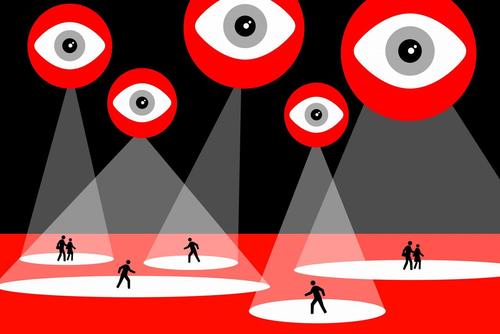“He sees you when you’re sleeping
He knows when you’re awake
He knows when you’ve been bad or good
So be good for goodness’ sake!”
- “Santa Claus Is Coming to Town”
Santa’s got a new helper.
No longer does the all-knowing, all-seeing, jolly Old St. Nick need to rely on antiquated elves on shelves and other seasonal snitches in order to know when you’re sleeping or awake, and if you’ve been naughty or nice.
Thanks to the government’s almost limitless powers made possible by a domestic army of techno-tyrants, fusion centers and Peeping Toms, Santa can get real-time reports on who’s been good or bad this year. This creepy new era of government/corporate spying—in which we’re being listened to, watched, tracked, followed, mapped, bought, sold and targeted—makes the NSA’s rudimentary phone and metadata surveillance appear almost antiquated in comparison.
Consider just a small sampling of the tools being used to track our movements, monitor our spending, and sniff out all the ways in which our thoughts, actions and social circles might land us on the government’s naughty list.
Tracking you based on your health status. In the age of COVID-19, digital health passports are gaining traction as gatekeepers of a sort, restricting access to travel, entertainment, etc., based on one’s vaccine status. Whether or not one has a vaccine passport, however, individuals may still have to prove themselves “healthy” enough to be part of society. For instance, in the wake of Supreme Court rulings that paved the way for police to use drug-sniffing dogs as “search warrants on leashes,” government agencies are preparing to use virus-detecting canine squads to carry out mass screenings to detect individuals who may have COVID-19. Researchers claim the COVID-sniffing dogs have a 95% success rate of identifying individuals with the virus (except when they’re hungry, tired or distracted). These dogs are also being to trained to ferret out individuals suffering from other health ailments such as cancer.
Tracking you based on your face: Facial recognition software aims to create a society in which every individual who steps out into public is tracked and recorded as they go about their daily business. Coupled with surveillance cameras that blanket the country, facial recognition technology allows the government and its corporate partners to identify and track someone’s movements in real-time. One particularly controversial software program created by Clearview AI has been used by police, the FBI and the Department of Homeland Security to collect photos on social media sites for inclusion in a massive facial recognition database. Similarly, biometric software, which relies on one’s unique identifiers (fingerprints, irises, voice prints), is becoming the standard for navigating security lines, as well as bypassing digital locks and gaining access to phones, computers, office buildings, etc. In fact, greater numbers of travelers are opting into programs that rely on their biometrics in order to avoid long waits at airport security. Scientists are also developing lasers that can identify and surveil individuals based on their heartbeats, scent and microbiome.
Tracking you based on your behavior: Rapid advances in behavioral surveillance are not only making it possible for individuals to be monitored and tracked based on their patterns of movement or behavior, including gait recognition (the way one walks), but have given rise to whole industries that revolve around predicting one’s behavior based on data and surveillance patterns and are also shaping the behaviors of whole populations. One smart “anti-riot” surveillance system purports to predict mass riots and unauthorized public events by using artificial intelligence to analyze social media, news sources, surveillance video feeds and public transportation data.
Tracking you based on your spending and consumer activities: With every smartphone we buy, every GPS device we install, every Twitter, Facebook, and Google account we open, every frequent buyer card we use for purchases—whether at the grocer’s, the yogurt shop, the airlines or the department store—and every credit and debit card we use to pay for our transactions, we’re helping Corporate America build a dossier for its government counterparts on who we know, what we think, how we spend our money, and how we spend our time. Consumer surveillance, by which your activities and data in the physical and online realms are tracked and shared with advertisers, has become big business, a $300 billion industry that routinely harvests your data for profit. Corporations such as Target have not only been tracking and assessing the behavior of their customers, particularly their purchasing patterns, for years, but the retailer has also funded major surveillance in cities across the country and developed behavioral surveillance algorithms that can determine whether someone’s mannerisms might fit the profile of a thief.--->READ LOTS MORE ON THIS HERE
If you like what you see, please "Like" us on Facebook either here or here. Please follow us on Twitter here.


No comments:
Post a Comment